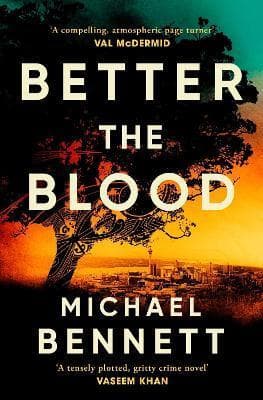Review: Better the Blood
Reviewed by Greg Fleming
Although this is Michael Bennett’s first foray into crime fiction, his first book, In Dark Places, won the best non-fiction title at the 2017 Ngaio Marsh awards and detailed the story of an ex-cop who helped bring the case of wrongly accused Teina Pora to light.
The book explored the knotty issues of injustice and race - Pora’s conviction was quashed in 2015 - as does Better the Blood. Bennett (Ngāti Pikiao, Ngāti Whakaue) is also a celebrated scriptwriter and filmmaker and was showrunner on the recent TVNZ series Vegas, an adaptation of a crime novel by Ray Berard, a show which ran into controversy about its depiction of Māori characters.
However, the advance word on Better the Blood was all positive with the book due to be released in the USA in early 2023 and publications planned in German, French, Czech, Italian, Hungarian, Finnish and Lithuanian.
It’s an Auckland-set story that revolves around a Māori detective Hana Westerman. Hana’s dedication and innate smarts mean she’s risen quickly through the ranks but she has never truly reconciled her cultural identity with the duties of the job.
We learn that Hana was part of the police presence at an infamous protest involving Māori (all tribes and locations in the novel are fictionalised but are reminiscent of the many actions by Māori seeking restoration of their whenua). There are images of Hana as a young policewoman dragging protestors away - actions that have isolated her from her wider whānau.
When a series of killings break out in the city, it is Hana who leads the investigation into what may be New Zealand’s first serial killer. The title is derived from the killer’s belief that “Better the blood of the innocent than no blood at all” – a killer who justifies their actions under the Māori philosophy of utu.
Bennett has not written a whodunnit – the protagonist is revealed around halfway through – instead he explores the impact of colonisation on Māori both in the past and present. That he is able to wrap such meaty issues up in a gripping page-turner is a remarkable feat for a debut novelist and in Hana he’s found the perfect character with which to explore these issues.
The novel opens in 1863 as a daguerreotype artist documents six British soldiers posing by the hanging body of a Māori leader. It’s this image – and years of working fruitlessly within the system to redress the balance - that propels the killer as he systematically begins to target their descendants.
“Since my ancestor was brutally executed, what has changed?” he says at one point. “Māori must beg for our own lands. Only a fraction of our land is ever returned…”
But this is not a diatribe. Alongside the political and cultural issues, Bennett gives us a compelling and action-packed thriller full of diverse and engaging characters. He writes in an afterword that “beneath the Tourism New Zealand billboards… blood is soaked deep into the volcanic soil of this place, from a recent past that is far less idyllic.”
That disjunction is brought home when we first meet Hana who’s watching the trial of a wealthy white man accused of raping a young Māori woman. The man, from a monied family and represented by a QC, gets off with a light sentence, something that disgusts but doesn’t surprise our protagonist.
Through the next 300 pages we watch as Hana rethinks and embraces her Māori identity and family priorities. It’s a moving, timely and powerful thriller that brings to life a crime story deeply embedded in our history.
Bennett, like North American crime writers S.A. Cosby and David Heska Wanbli Weiden, articulates the generational impact a history of trauma and injustice can wreak on a people. The result is a riveting thriller, grounded in our national disputes, but one that will echo with readers the world over.
Reviewed by Greg Fleming
